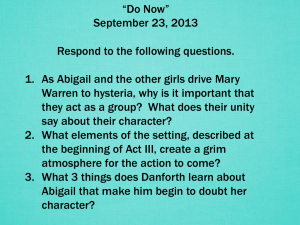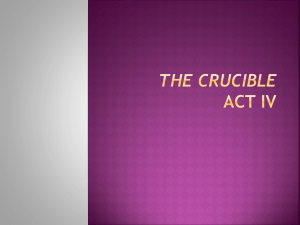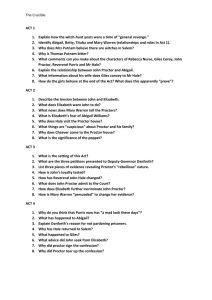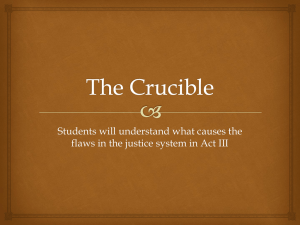In American law there is a conecpt of “innocent until proven guilty
advertisement
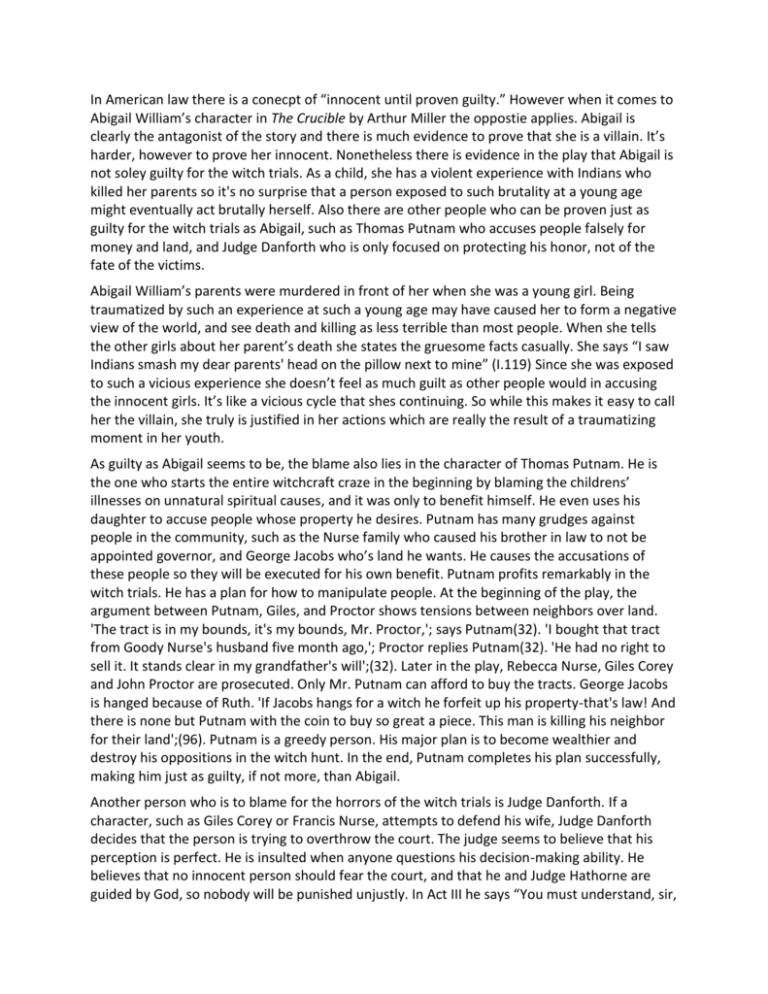
In American law there is a conecpt of “innocent until proven guilty.” However when it comes to Abigail William’s character in The Crucible by Arthur Miller the oppostie applies. Abigail is clearly the antagonist of the story and there is much evidence to prove that she is a villain. It’s harder, however to prove her innocent. Nonetheless there is evidence in the play that Abigail is not soley guilty for the witch trials. As a child, she has a violent experience with Indians who killed her parents so it's no surprise that a person exposed to such brutality at a young age might eventually act brutally herself. Also there are other people who can be proven just as guilty for the witch trials as Abigail, such as Thomas Putnam who accuses people falsely for money and land, and Judge Danforth who is only focused on protecting his honor, not of the fate of the victims. Abigail William’s parents were murdered in front of her when she was a young girl. Being traumatized by such an experience at such a young age may have caused her to form a negative view of the world, and see death and killing as less terrible than most people. When she tells the other girls about her parent’s death she states the gruesome facts casually. She says “I saw Indians smash my dear parents' head on the pillow next to mine” (I.119) Since she was exposed to such a vicious experience she doesn’t feel as much guilt as other people would in accusing the innocent girls. It’s like a vicious cycle that shes continuing. So while this makes it easy to call her the villain, she truly is justified in her actions which are really the result of a traumatizing moment in her youth. As guilty as Abigail seems to be, the blame also lies in the character of Thomas Putnam. He is the one who starts the entire witchcraft craze in the beginning by blaming the childrens’ illnesses on unnatural spiritual causes, and it was only to benefit himself. He even uses his daughter to accuse people whose property he desires. Putnam has many grudges against people in the community, such as the Nurse family who caused his brother in law to not be appointed governor, and George Jacobs who’s land he wants. He causes the accusations of these people so they will be executed for his own benefit. Putnam profits remarkably in the witch trials. He has a plan for how to manipulate people. At the beginning of the play, the argument between Putnam, Giles, and Proctor shows tensions between neighbors over land. 'The tract is in my bounds, it's my bounds, Mr. Proctor,'; says Putnam(32). 'I bought that tract from Goody Nurse's husband five month ago,'; Proctor replies Putnam(32). 'He had no right to sell it. It stands clear in my grandfather's will';(32). Later in the play, Rebecca Nurse, Giles Corey and John Proctor are prosecuted. Only Mr. Putnam can afford to buy the tracts. George Jacobs is hanged because of Ruth. 'If Jacobs hangs for a witch he forfeit up his property-that's law! And there is none but Putnam with the coin to buy so great a piece. This man is killing his neighbor for their land';(96). Putnam is a greedy person. His major plan is to become wealthier and destroy his oppositions in the witch hunt. In the end, Putnam completes his plan successfully, making him just as guilty, if not more, than Abigail. Another person who is to blame for the horrors of the witch trials is Judge Danforth. If a character, such as Giles Corey or Francis Nurse, attempts to defend his wife, Judge Danforth decides that the person is trying to overthrow the court. The judge seems to believe that his perception is perfect. He is insulted when anyone questions his decision-making ability. He believes that no innocent person should fear the court, and that he and Judge Hathorne are guided by God, so nobody will be punished unjustly. In Act III he says “You must understand, sir, that a person is either with this court or he must be counted against it, there be no road between. This is a sharp time, now, a precise time—we live no longer in the dusky afternoon when evil mixed itself with good and befuddled the world. Now, by God’s grace, the shining sun is up, and them that fear not light will surely praise it.” Danforth is saying that anyone who opposes the court cannot be an honest person, because they represent God and one cannot have disagreements because God is always true. Since the court is conducting the trials, anyone who questions the trials, such as Proctor or Giles Corey, is their enemy. So if the court does God’s work, their enemy must be a servant of the Devil. As a result of this, Danforth fails to examine evidence critically or to act when he could to stop the hysteria. Even in Act Four, when it becomes clear that the allegations of witchcraft are completely false, Danforth refuses to see the truth. He hangs innocent people to avoid sullying his reputation. Cleary Danforth is guilty in the acts of the trials, so Abigail really shouldn’t be portrayed as the only villain. When one looks closer at the facts it becomes clear that Abigail Williams is not fully to blame for the accusations and trials. A traumatizing experience justifies her own actions, and Danforth and Putnam are equally to blame for the horrors that occurred. While Abigail is the classic villain in the play, when her actiona are anazlyzed and she is compared to other characters who took part, she can be considered proven innocent.


